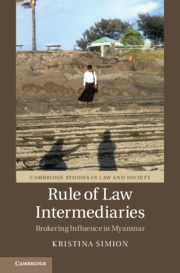Book contents
- Rule of Law Intermediaries
- Cambridge Studies in Law and Society
- Rule of Law Intermediaries
- Copyright page
- Dedication
- Contents
- Tables
- Preface
- Acknowledgements
- Abbreviations
- Chapter One Introduction
- Chapter Two Between Universals and Particulars: Rule of Law as a Travelling Model
- Chapter Three Intermediaries: Who, What, When?
- Chapter Four Rule of Law Assistance: Actors and Technologies
- Chapter Five The Emergence of Intermediaries
- Chapter Six Intermediaries: Background, Capital, Motivations
- Chapter Seven Intermediaries as Trust Builders
- Chapter Eight Intermediaries as Translators
- Chapter Nine Intermediaries’ Influence, Foreign Actors’ Dependence
- Appendix Overview of Research Participants
- References
- Index
- Cambridge Studies in Law and Society
Chapter Three - Intermediaries: Who, What, When?
Published online by Cambridge University Press: 17 April 2021
- Rule of Law Intermediaries
- Cambridge Studies in Law and Society
- Rule of Law Intermediaries
- Copyright page
- Dedication
- Contents
- Tables
- Preface
- Acknowledgements
- Abbreviations
- Chapter One Introduction
- Chapter Two Between Universals and Particulars: Rule of Law as a Travelling Model
- Chapter Three Intermediaries: Who, What, When?
- Chapter Four Rule of Law Assistance: Actors and Technologies
- Chapter Five The Emergence of Intermediaries
- Chapter Six Intermediaries: Background, Capital, Motivations
- Chapter Seven Intermediaries as Trust Builders
- Chapter Eight Intermediaries as Translators
- Chapter Nine Intermediaries’ Influence, Foreign Actors’ Dependence
- Appendix Overview of Research Participants
- References
- Index
- Cambridge Studies in Law and Society
Summary
This chapter charts what we know about intermediaries across settings and times in history, to provide a comparative perspective on their being within fields of development that broadly relate to interventions of law, regulation, rule of law, justice, and institutions. It focuses on the concept of the intermediary as an analytical means of identifying the social nodes in transnational networks of relative positions and power. It highlights the role that intermediaries play and the challenges they face, at the interfaces of different knowledge and value systems that appear as the development industry intervenes across the globe. It uses an inductive approach, which was key for locating individuals who played an intermediary role in Myanmar’s rule of law assistance field across several institutional positions: local lawyers; local NGOs; locally employed staff of international organisations; government employees; and international consultants. Despite their different roles and assignments, they all had in common having to perform the delicate task of relating larger, globally oriented ideas to the Myanmar locale, in a key middle position between foreign, national and local actors.
Keywords
- Type
- Chapter
- Information
- Rule of Law IntermediariesBrokering Influence in Myanmar, pp. 54 - 73Publisher: Cambridge University PressPrint publication year: 2021



